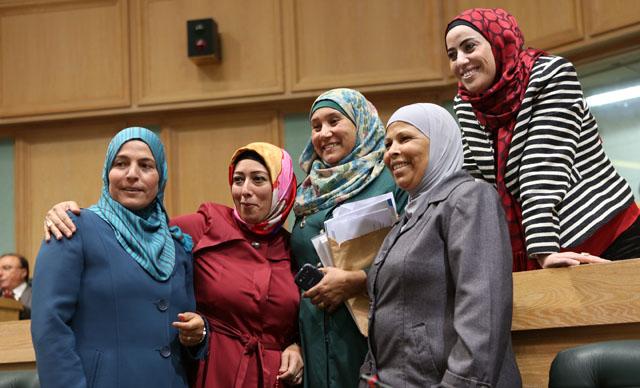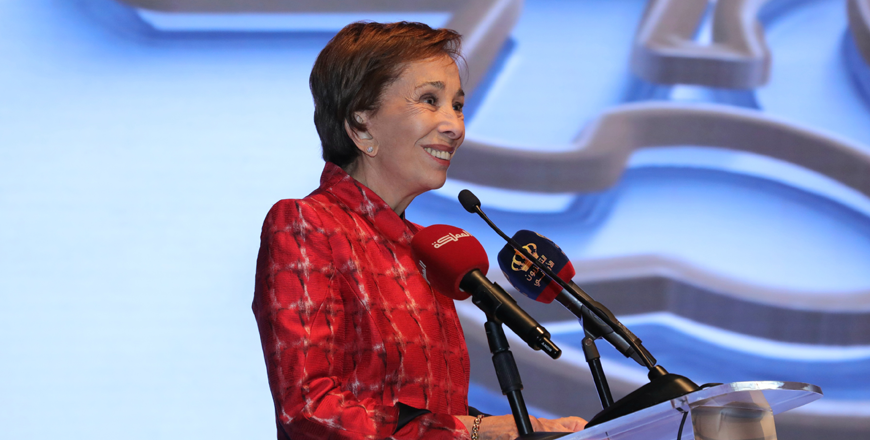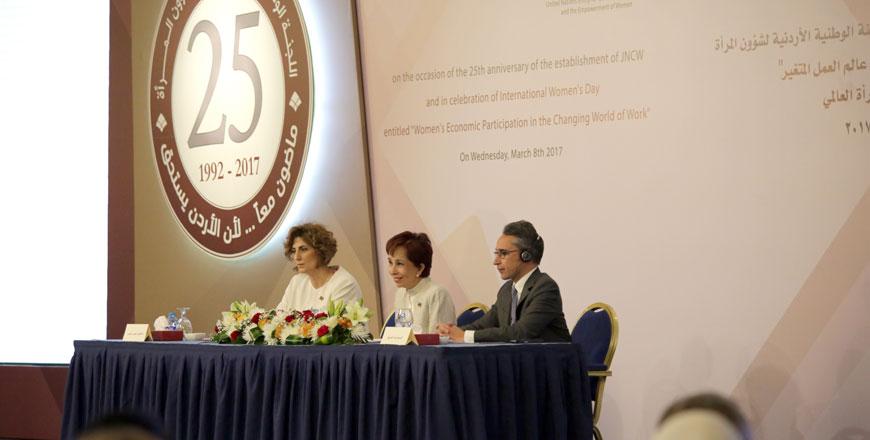You are here
Ensuring women's access to justice crucial to gender equality — activists
By Rana Husseini - Mar 08,2015 - Last updated at Mar 08,2015

AMMAN — Justice through the rule of law and ensuring women’s access to justice is the key component for true gender equality, academics, policy experts and women’s rights groups said on Sunday during a national event to marking International Women’s Day.
HRH Princess Basma, president of the Jordanian National Commission for Women (JNCW), acted as patron at the one-day event titled “Women’s Access to Justice: Prospects and Perspectives” at Columbia University Middle East Research Centre.
The conference brought together international, regional and local speakers to discuss ways stakeholders can effectively create spaces and opportunities to fulfil the rights of women in accessing justice, participating in decision making and rejecting all forms of discrimination that give rise to gender inequality.
“It is difficult for women to access justice, and hence, respect for the rule of law remains a mere, elusive notion,” said Princess Basma, who is also chairwoman of the Jordanian National Forum for Women and honorary president the General Federation of Jordanian Women.
“Because of this, many women believe that justice is unattainable. So we must make a clear show of willingness to transcend traditional limits, and support women's access to justice to ensure their human rights," added the princess, who is UN Women Goodwill Ambassador.
In line with the internationally recognised principle that women’s rights are human rights, she stressed that “human rights must be codified in law, clearly and specifically, at the international and national levels.”
“But this alone cannot guarantee the full enjoyment of rights. There must also be respect for the very principles which inform the law,” the honorary president of the University of Jordan Centre for Women’s Studies noted.
The state can validate these principles by providing judicial and administrative protection, and viable means of recourse, the princess said.
“We must therefore direct our national efforts to enhancing the concept of the independent judicial authority as called for by His Majesty King Abdullah. A judiciary that is independent, integral, effective and efficient, befitting a progressive society which upholds human rights and freedoms, and prohibits their violation by any party — be it individual, group or authority,” Princess Basma stressed at the event, organised in partnership with the Arab Renaissance for Democracy and Development (ARDD)-Legal Aid and the JNCW, and attended by 30 Jordanian judges,
ARDD-Legal Aid Chairman Zaid Eyadat said the conference is an important step in the fight to address the marginalisation of women and barriers to achieving gender justice.
“Gender justice means eliminating legal, economic and social barriers facing women worldwide, regionally and locally.”
In Jordan, he added, “a staggering 95 per cent of rapists continue to go unpunished under Article 308 of the Penal Code and in 2013, 13.2 per cent of marriages registered in Jordan were child marriages.”
“Clearly, we have a long way to go in achieving political, social and economic justice for women, not just in Jordan, but worldwide. Advancing women’s rights and access to justice must occur on many different levels,” Eyadat told the gathering.
Enabling women’s participation in the public sphere and eliminating barriers to accessing justice is one of the many ways to do so, he pointed out, adding that “we must develop and advocate policies that ensure legal and justice systems, which effectively provide an avenue for women to claim their rights.”
In her address, JNCW Secretary General Salma Nims said men and women should join hands in “finding the best ways to access justice through the collaboration of decision makers and civil society”.
Greek Ambassador to Jordan Maria Louisa Marinakis, who presented a paper titled “Women’s Access to Justice: The European Perspective”, noted that lack of access to justice is widespread and not only among women.
“Achieving judicial access and integrity is not a top-down, supply driven process. It relates to inclusive societies that do not disregard and marginalise... [some] of their citizens,” Marinakis said.
“We need to continuously ensure genuine civic engagement, especially with the young people, to work on education curricula in order to change stereotypes, to empower women and create bottom-up demand for judicial accountability, in order to be able to talk about living in a real inclusive and democratic society which protects and equally promotes the fundamental rights of all its citizens, regardless of their gender,” she added.
The event was supported by the Finnish and Norwegian foreign ministries, Oxfam GB and the Centre for Women’s Studies at the University of Jordan.
Related Articles
Jordan marks International Women’s Day this week with multiple activities that highlight achievements and what still needs to be done to promote women’s rights.
AMMAN — HRH Princess Basma on Wednesday called for the expansion of knowledge and capabilities, creating broader platforms for women’s voice
By AMMAN — The Jordanian National Commission for Women (JNCW) on Wednesday celebrated International Women’s Day, which coincided



















